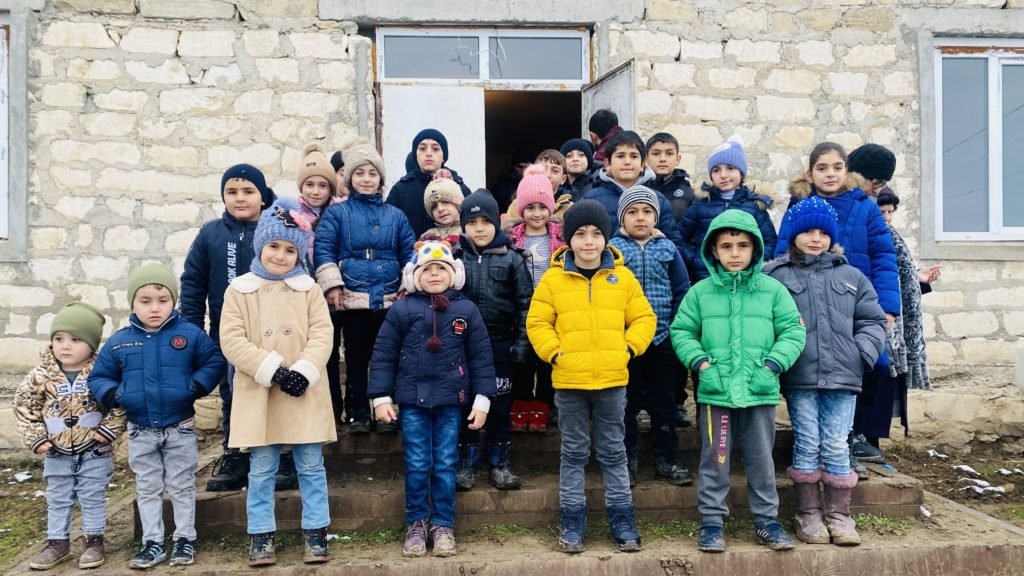
Have you ever wondered what Christmas looks like while living under siege? In Artsakh, 120,000 people, including 30,000 children, are living under a blockade, cut off from the only road connecting them to the world. The children are afraid that Santa Claus will not come because of the illegal road closure. How does one build and uplift a festive spirit when the wounds of these young people have yet to heal from the tragic 2020 Artsakh War?
Nina Shahverdyan is an English teacher in Herher village in the region of Martuni. She staged Charles Dickens’ A Christmas Carol with her students. The story features themes of compassion, redemption, generosity and friendship. While people in different parts of the world are preparing for Christmas and the New Year, thousands of families in Artsakh are concerned about surviving the winter season under blockade.
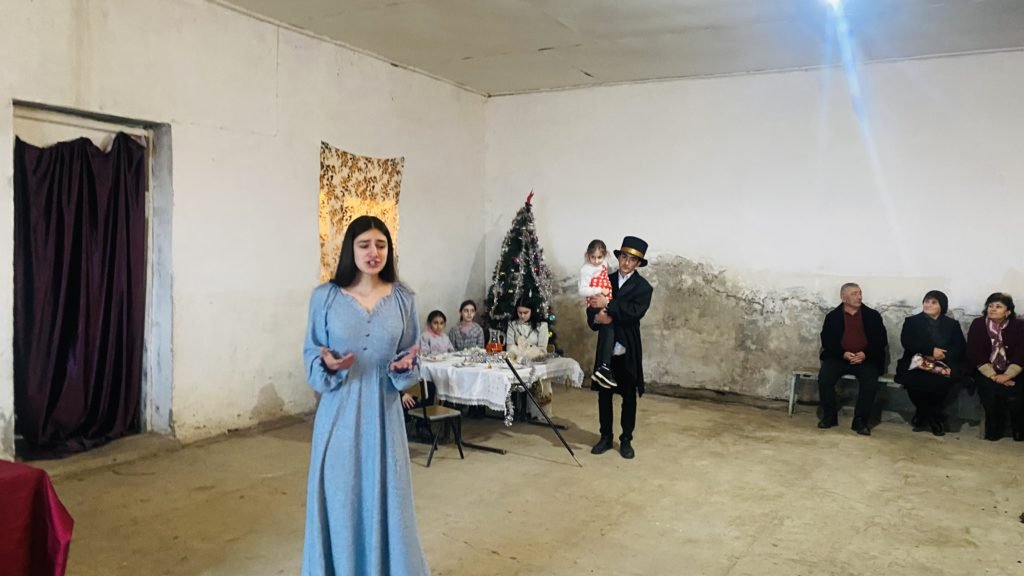
Christmas is a time for sharing. After two weeks under blockade in Artsakh, the act of sharing is understood in the most literal sense. Facing a shortage of food, medicine, fuel and other vital goods, the people have been sharing their resources and bartering with each other.
Ms. Nina, who works in the Stepanakert market, says that mothers come and beg for a kilogram of potatoes and carrots to make soup or puree for children. It is impossible to find infant formula in pharmacies. When asked about celebrating New Year’s and Christmas, Ms. Nina says, “We don’t have the heart to celebrate the New Year and Christmas under the blockade, when we don’t even know if we will survive.”
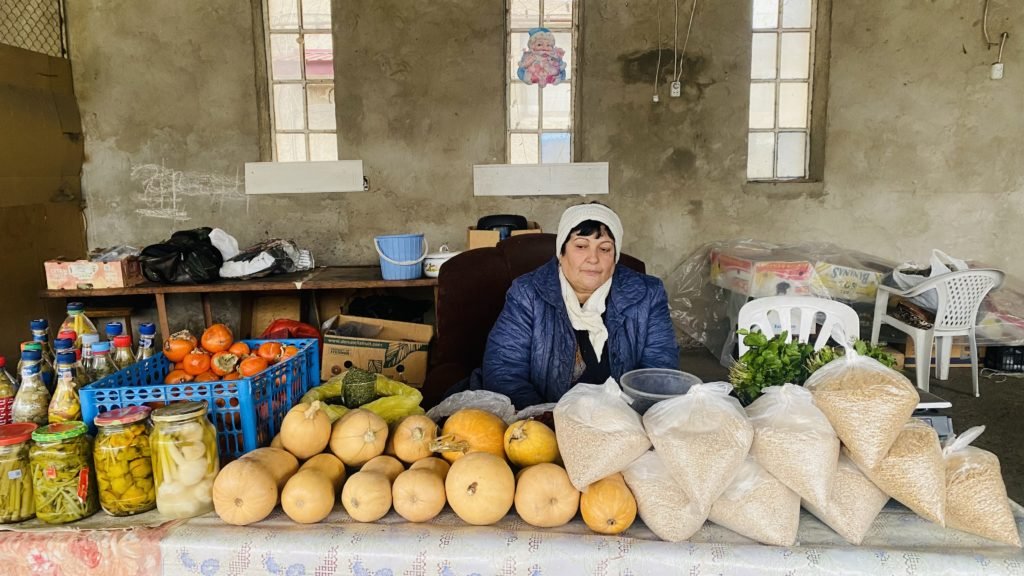
Angela, whose husband died during the first war, is a mother of two. She remembers depriving her son of a cookie during the first war; now the current crisis has deprived her grandchildren of essential food. “I live to create a Christmas mood for my grandchildren, but they [Azeris] came and wrecked everything. They even took away that little pleasure. With what mood should we welcome Christmas? With what expectations?”
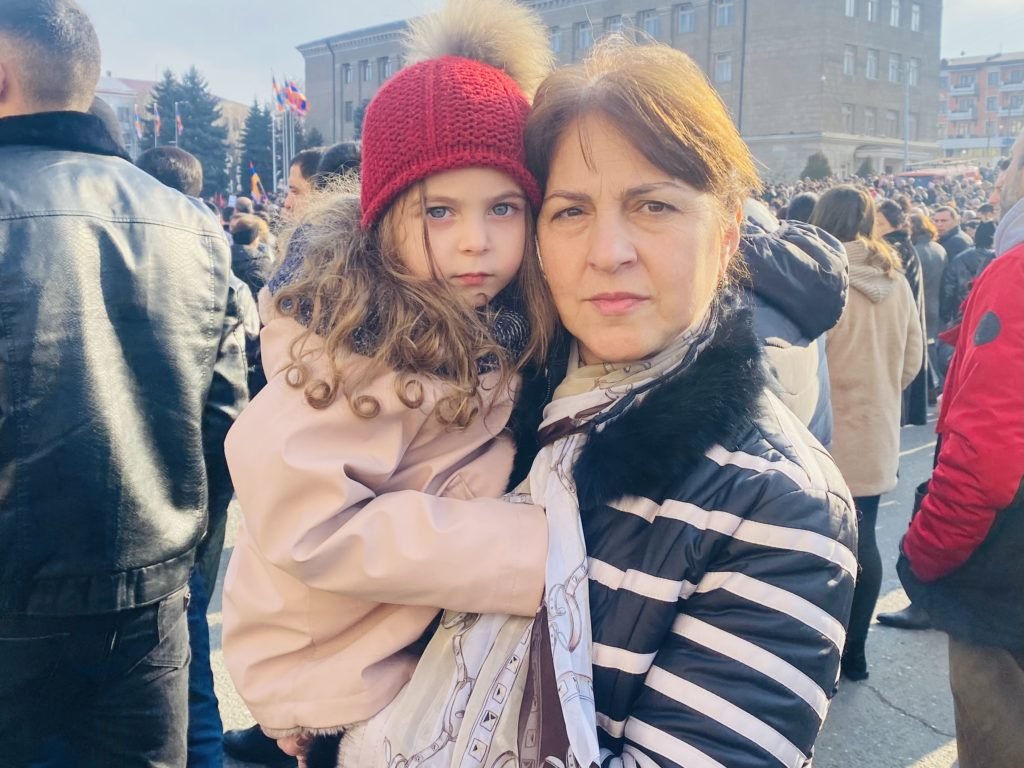
It is said that Christmas is a time for families to unite. At the moment, there are more than one thousand Artsakh citizens in Armenia who want to return home to their families, but they are unable. Among them are children who went to participate in cultural and sports events, patients who received treatment and hundreds of students.
Ani used to study in Shushi. When Shushi came under occupation after the 44-day war, she had to move to Yerevan to continue her studies at the State Academy of Fine Arts of Armenia. She was bereaved of her father during war, and this is why she feels a stronger inclination to spend Christmas with her mother, brothers and grandmother. Ani is one of hundreds of students who passed the interim exams and want to return home, but they cannot because the only road connecting Artsakh to Armenia is closed. Ani’s mother Susanna tries to comfort her and tells her at least one member of the family is in a safer place and not exposed to scarcity of food. She says it is best for her daughter to stay in Yerevan.

Children traditionally receive gifts on Christmas. The Artsakh government prepares a small gift for children every year. These gifts are ordered in advance from Yerevan. A number of organizations and individuals send and give gifts as well, but these gifts will not arrive due to the road closure as well.
More than 100 children displaced from Hadrut and currently living in Stepanakert practice their art lessons in the music school. Art school director Tatevik Mkrtchan says that even under blockade, they will organize the Christmas event for children—some light in this darkness, unless, God forbid, they bomb us, she says. The displaced children from Shushi and Hadrut living in a Stepanakert hostel believe that Santa Claus will ‘’break’’ the blockade and bring them gifts.
December 23 saw a Christmas tree lighting ceremony in Stepanakert at Shahumyan Ring Park. Santa Claus and Snow Maiden brought joy to thousands of children. Everyone in Artsakh wishes for survival and peace, as well as the reopening of the road to Mother Armenia and the safe return of their relatives.
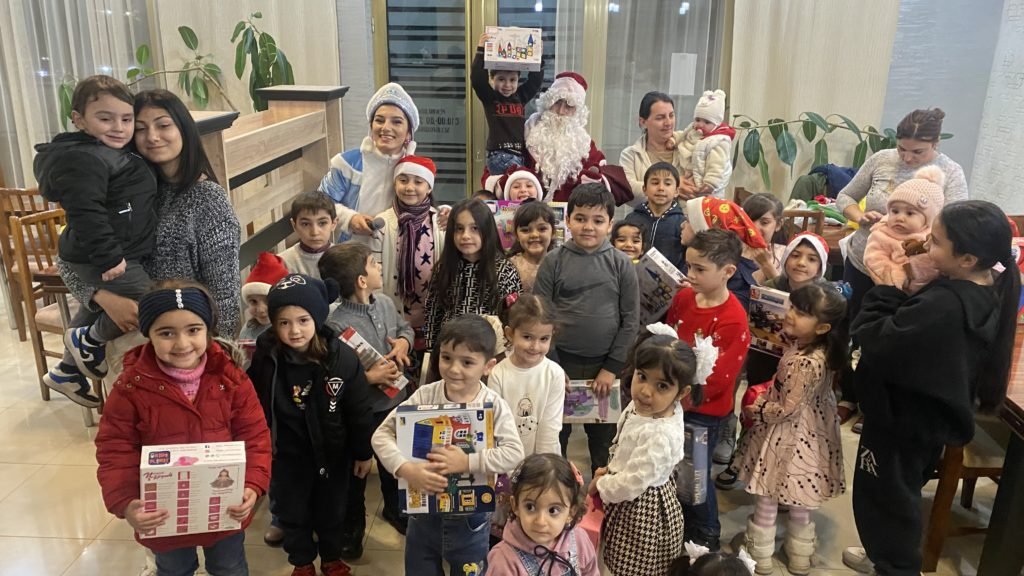
In A Christmas Carol, the main character Scrooge ultimately decides to change his ways. He wakes up on Christmas morning seeing the world anew and chooses to be kind, generous and compassionate from that day forward. Will the world be kinder and more compassionate to the 30,000 children and their families under siege in Artsakh in this small corner of the world?



This message is for the author of this article, Siranush Sargsyan.
Hello ma’am, my name is Joshua Rozanski and I live in the United States of America. Im an independent researcher/consultant regarding international law, economics and security cooperation, working to support and develop nations rights to self-determination and diplomatic engagement. Im accredited as a Master of Arts in Diplomacy from Norwich University School of Diplomacy, and I have a Bachelor’s of Arts in Political Science from California State University East Bay.
In addition, I’m a military veteran, being honorably discharged as a non-commissioned officer with leadership experience. I also hold membership as a member of the International Association of Writers Printers and Editors (IAPWE) as a result of past graduate research work and have contributed in the past to the Center for International Policy non-profit organization.
I read your article “Christmas in Artsakh under blockade,” and I was moved by it. I myself have been monitoring events through various news sources regarding events in Artsakh, and it saddens me the blockade is still in effect. The world’s silence for the most part in my opinion is inexcusable, especially as the world is changing so much so fast in many ways. You’re article conveyed a sense of true emotion behind these events from a human perspective, not a cold, bureaucratic one as in many other sources documenting these events transpiring even now.
Respectfully, I would like to offer my assistance and support in any way I can help within my professional abilities to the people of Artsakh during this time, volunteering them if you are aware of any ways to do so. Again, I am an independent researcher/consultant and advocate regarding international law economics security cooperation, and I work remotely from the United States. I am willing to provide my CV, as well as evidence of my stated credentials and past research work if requested.
Please feel free to reach out to me at anytime if you wish to correspondence further. I can be reached at jazz15651@yahoo.com for email correspondence. Again, I thank you for your time, and wish you a safe and blessed holiday season.
Very Respectfully and Sincerely Joshua Rozanski
The concept of an eye for an eye for this filthy Azerbaijani tribe is nothing new and it is very close to their hearts. Therefore, Armenians should devise a secret plan to turn their New Year’s Day (Novruz Bayrami) celebration on March 21 into a day of mourning instead. They should be taught a lesson they will never forget for another thirty years. As we’ve been witnessing for the last couple of weeks, for these despicable hyenas the lives of Armenians, from toddlers to elderly, is unimportant and they could care less even if they are made to starve to death for their political trickery. We must hit back at them and hit back very hard. These animals are not environmentalists but the agents of their fascist government. If they were environmentalists they would have raised concerns on environmental issues in their own backyards first and foremost caused by their oil fields for decades that are exploited to fill the pockets of the corrupt Aliyev clan.